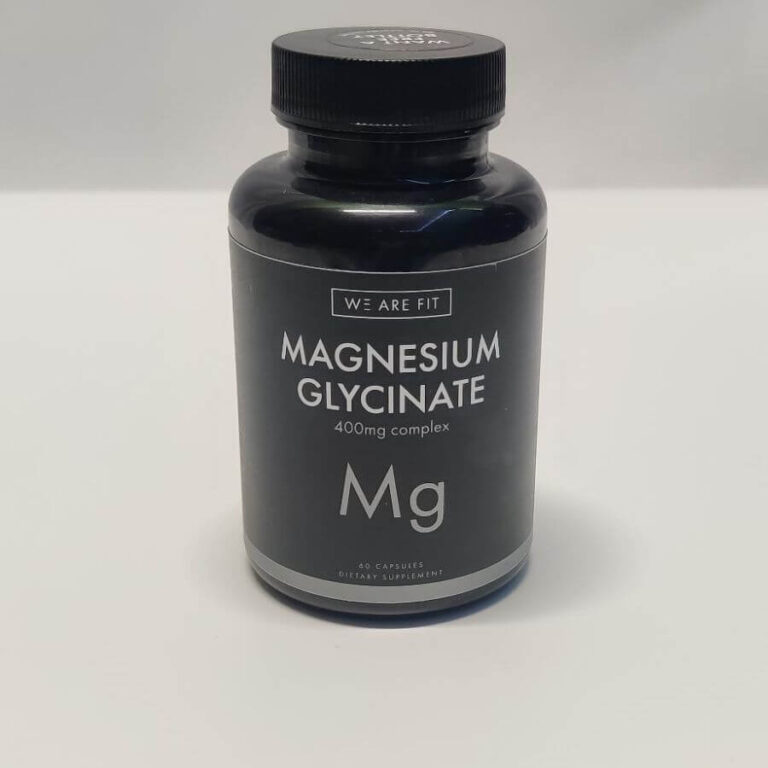Magnesium is a vital mineral that is essential for many functions in the human body. It is involved in 300+ enzymatic reactions and plays a crucial role in nerve and muscle function. Magnesium also has analgesic properties, which can help to reduce pain associated with various conditions. Magnesium may also help reduce pain from muscle tension and muscle aches due to its role in the muscular system.
What is Magnesium?
Magnesium is a mineral found naturally in many foods, including green leafy vegetables, nuts, and whole grains. It is available as a dietary supplement, typically in the form of magnesium oxide, magnesium citrate, or magnesium chloride.
Magnesium is involved in various physiological processes in the body, including muscle and nerve function, heart rhythm, and blood pressure regulation. It is also known to have analgesic properties that can help to reduce pain associated with various conditions.
Which Conditions is Magnesium Good for?
- Migraine headaches: Several studies have found that magnesium can help to reduce the frequency and intensity of migraine headaches by relaxing the blood vessels in the brain.
- Fibromyalgia: a chronic pain condition that affects the muscles and soft tissues of the body. Magnesium supplements may help to reduce pain and improve sleep in people with fibromyalgia.
- Back & Muscle pain: Magnesium helps to relax the muscles, which can help to reduce muscle tension and spasms that can contribute to pain.
- Menstrual cramps: Magnesium may help reduce the severity of menstrual cramps by relaxing the uterus muscles.
- Nerve Pain: Magnesium plays a part in healthy nerve function and can help reduce pain signals sent via the nerve pathway.
- Chronic pain: magnesium supplements may help reduce chronic pain associated with conditions such as osteoarthritis and low back pain.
Magnesium for back pain, muscle pain, and sciatica pain
Magnesium is a a natural muscle relaxant and can help reduce muscle tension and spasms that can contribute to pain. One of the primary ways that Magnesium helps reduce pain is by relaxing muscles and nerves.
Magnesium also acts as a natural calcium channel blocker, which can help reduce the influx of calcium ions into cells, reducing pain signals. Calcium ions play an role in muscle contraction, and when calcium levels are too high, it can lead to muscle cramps and spasms. By blocking calcium channels, magnesium can help to reduce the influx of calcium ions into cells, which can lead to a reduction in muscle pain and cramping.
In addition to its muscle-relaxing and calcium-blocking properties, Magnesium may also have anti-inflammatory effects that can help to reduce pain. Inflammation is a common underlying cause of pain and can contribute to conditions like arthritis and other inflammatory disorders. Magnesium has been shown to have anti-inflammatory effects in animal and human studies, which may help to reduce pain associated with inflammation.
Magnesium for arthritis
Arthritis is a condition that causes inflammation and pain in the joints and can be caused by various factors, including age, injury, and autoimmune disorders. Magnesium has anti-inflammatory properties that may help to reduce inflammation in the joints and alleviate arthritis pain.
In addition to its anti-inflammatory properties, Magnesium may help reduce muscle tension and spasms, which can contribute to joint pain in people with arthritis.
Several studies have examined the effects of magnesium supplements on arthritis pain with mixed results. One study found that magnesium supplements improved pain and mobility in people with knee osteoarthritis. In contrast, another study found that magnesium supplements had no significant effect on pain in people with rheumatoid arthritis.
Magnesium for neuropathy (Nerve Pain)
Yes, Magnesium can help with nerve pain in some cases. Neuropathic pain is usually caused by damage or dysfunction of the nervous system and can be challenging to treat. However, Magnesium may effectively reduce nerve pain due to its ability to regulate nerve function and reduce inflammation.
Magnesium is involved in many processes in the body that are important for nerve function, including regulating ion channels and neurotransmitters. Magnesium helps regulate the activity of NMDA receptors, which transmit pain signals in the nervous system. By regulating NMDA receptor activity, Magnesium can help to reduce the transmission of pain signals and provide pain relief.
In addition to its effects on NMDA receptors, Magnesium can also help reduce inflammation, contributing to nerve pain. Inflammation is a common underlying cause of nerve pain, and various factors, including injury, infection, and chronic disease, can trigger it. Magnesium has anti-inflammatory properties, which can help to reduce inflammation and alleviate nerve pain.
Overall, the ability of Magnesium to regulate nerve function and reduce inflammation makes it a potentially effective supplement for reducing nerve pain.
How to Take Magnesium for Pain Relief?

The recommended daily allowance of Magnesium is 400-420 mg for adult men and 310-320 mg for adult women. Magnesium supplements are available over the counter in various forms, including capsules, tablets, and powders.
Are there any side effects when taking Magnesium for pain relief?
While Magnesium is generally safe for most people when taken in appropriate doses, there can be some potential side effects associated with magnesium supplements.
One of magnesium supplements’ most common side effects is digestive upset, including diarrhea, nausea, and abdominal cramping. This is particularly true if you take too much Magnesium, as excess Magnesium can have a laxative effect.
In addition to digestive upset, magnesium supplements can interact with other medications such as: antibiotics, diuretics, and some blood pressure medications. Magnesium can also interact with some health conditions, including kidney disease, heart disease, and certain neuromuscular disorders.
It is also possible to have an allergic reaction to magnesium supplements, although this is rare. Signs of an allergic reaction may include swelling of the face, lips, tongue, or throat, difficulty breathing, or hives.
Conclusion
Overall, the analgesic properties of Magnesium make it a potentially helpful supplement for people with various types of pain. Magnesium is an essential mineral with many health benefits, including its ability to reduce pain associated with various conditions.
Although research is needed to fully understand the mechanisms by which Magnesium works for pain relief, High-quality sources such as NIH.gov provide valuable scientific evidence that supports the use of Magnesium for pain relief.
**If you are considering using Magnesium for pain relief, you must talk to your healthcare provider first, as magnesium supplements can interact with some medications and health conditions.
References:
- Schwalfenberg GK, Genuis SJ. The Importance of Magnesium in Clinical Healthcare. Scientifica (Cairo). 2017;2017:4179326.
- Peikert A, Wilimzig C, Kohne-Volland R. Prophylaxis of migraine with oral Magnesium: results from a prospective, multi-center, placebo-controlled and double-blind, randomized study. Cephalalgia. 1996;16(4):257-263.
- Bagis S, Karabiber M, As I, Tamer L, Erdogan C, Atalay A. Is magnesium citrate treatment effective on pain, clinical parameters, and functional status in patients with fibromyalgia? Rheumatol Int. 2013;33(1):167-172.
- Deligeoroglou E, Creatsas G. Oral magnesium supplementation reduces dysmenorrhea in women with premenstrual syndrome: a randomized, double-blind, placebo-controlled trial. Am J Obstet Gynecol. 2010;202(1):e1-11.
- Zhang Y, Neogi T, Chen C, et al. Low-Dose Magnesium Sulfate for Treating Acute Pain in the Emergency Department: A Randomized, Double-Blind, Placebo-Controlled Trial. Ann Emerg Med. 2013;61(4):353-362.e9. doi: 10.1016/j.annemergmed.2012.10.026.
- Fawcett WJ, Haxby EJ, Male DA. Magnesium: physiology and pharmacology. Br J Anaesth. 1999;83(2):302-320. doi: 10.1093/bja/83.2.302.
- Office of Dietary Supplements – Magnesium. National Institutes of Health. https://ods.od.nih.gov/factsheets/Magnesium-HealthProfessional/. Accessed February 15, 2023.




